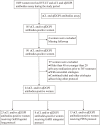Anticardiolipin and/or anti-β2-glycoprotein-I antibodies are associated with adverse IVF outcomes
- PMID: 36405731
- PMCID: PMC9667022
- DOI: 10.3389/fimmu.2022.986893
Anticardiolipin and/or anti-β2-glycoprotein-I antibodies are associated with adverse IVF outcomes
Abstract
Objective: The purpose of the study is to evaluate the effects of anticardiolipin (aCL) and/or anti-β2-glycoprotein-I (aβ2GPI) antibodies, namely antiphospholipid antibodies (aPL), on in vitro fertilization (IVF) outcomes.
Materials and methods: The study group comprised infertile women with aPL undergoing IVF-ET cycles. Controls were infertile women with tubal etiology without aPL. The impact of aPL on reproductive outcomes, such as oocyte quality, embryo quality, and implantation capacity, was compared between the study group and controls. Additionally, peripheral blood T cell subsets, such as T helper (Th)1, Th2, Th17, and T regulatory (Treg) cells and cytokines, were analyzed by the flow cytometry. Differences between the study group and controls were analyzed.
Results: A total of 132 infertile women, including 44 women with aPL, and 88 controls were sequentially recruited for this study. Women with aPL had lower numbers of total and perfect/available embryos and lower rates of MII oocytes, blastocyst formation, perfect and available embryos, implantation, clinical pregnancy, and take-home baby. Additionally, imbalanced Th1/Th2 and Th17/Treg ratios, significantly higher levels of serum IL-2, TNF-α, IFN-γ, and IL-17A, and a significantly lower serum IL-4 were noticed in women with aPL compared to controls.
Conclusion: Women with aPL such as aCL and/or aβ2GPI antibodies were associated with adverse IVF outcomes. Early screening for aPL and appropriate consultation for couples undergoing IVF should be considered. In addition, underlying immunopathology and inflammatory immune mechanisms associated with aPL should be further explored.
Keywords: IVF outcomes; anti-β2-glycoprotein-I; anticardiolipin; antiphospholipid syndrome; pregnancy outcome.
Copyright © 2022 Wu, Fang, Lu, Zhang, Wang and Kwak-Kim.
Conflict of interest statement
The authors declare that the research was conducted in the absence of any commercial or financial relationships that could be construed as a potential conflict of interest.
Figures





References
Publication types
MeSH terms
Substances
LinkOut - more resources
Full Text Sources
Medical

